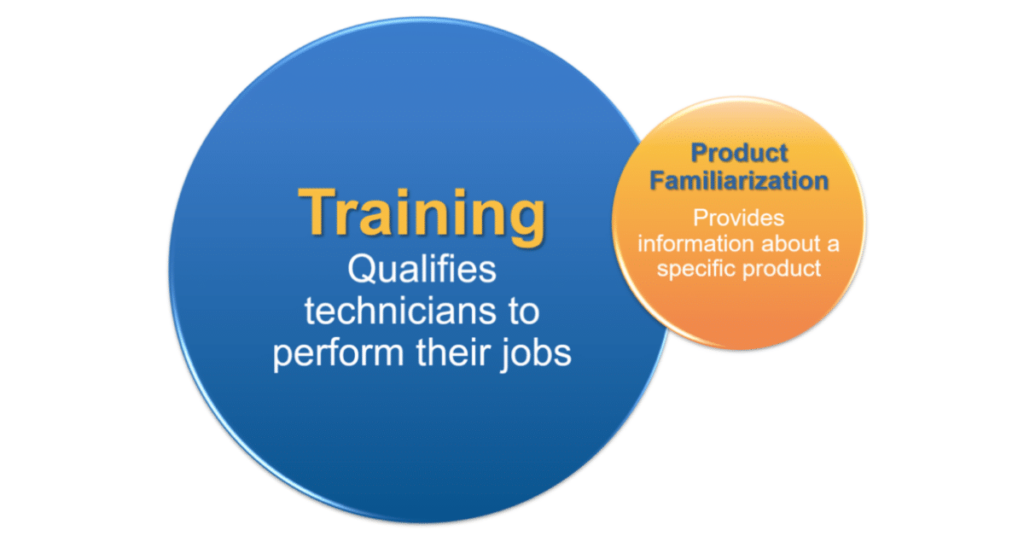By Emily Rios, Learning and Content Developer, NGVi
Customers often ask, “Why do we need NGVi technician training when we can get training from the manufacturer?” The short answer is, “You need both.” What most manufacturers call “training” is actually product familiarization. To recognize the value of both, it is important to understand the differences between the two.
Training Versus Familiarization

Training is the fundamental instruction required to build new skills and knowledge that qualify technicians to perform their jobs correctly and effectively. Training involves not only imparting knowledge, but also creating the environment in which technicians develop specific skills. The knowledge and skills gained from training enable technicians to competently and safely perform their job tasks, including recognition of potential hazards. Authentic training is provided by subject matter experts who hold specific training credentials or accreditations and practice the science of bringing about permanent change.
Training develops skills that transform a technician from unqualified to qualified.
Familiarization, on the other hand, is information regarding the unique functions, features and serviceability of a manufacturer’s product. In other words, familiarization can be referred to as “telling.” Product familiarization “tells” technicians the highlights of a product, but generally does not involve skill development required to qualify them to do their jobs. Product familiarization is usually provided by a sales or technical representative of the manufacturer.
Familiarization or “telling” is transmitting information.
Put simply, training is a two-step process that involves both imparting knowledge and developing skill, while product familiarization generally is a one-step “telling” process.
Hand-in-Hand
For product familiarization to be useful for a technician, that technician must already be qualified, or in other words, trained. For example, a technician servicing a heavy-duty NGV may receive familiarization from the engine manufacturer that points out unique natural gas-related engine components. This information on its own does not, however, develop the necessary skills required to diagnose a problem or service the components properly. Conversely, when technicians are trained, they not only learn how to identify all components and their functions, but also their theory of operation, as well as the most common failure modes—but more importantly, specific steps to properly maintain and service them. In other words, technician training develops skills.
Likewise, when a technician receives product familiarization from a fuel system manufacturer, he or she receives an overview of the system and its components. However, the technician will not walk away from familiarization with the knowledge needed or the skills required to diagnose specific problems.
Bottom line is, technicians need both training and product familiarization, and those who receive both are the greatest assets to their employers. They are not only qualified to perform their jobs, but are familiar with the specific engines and fuel systems on the vehicles they maintain.
| Training Vs. Familiarization at a Glance | ||
|
|
Training | Product Familiarization |
| What It Does | Qualifies technicians to perform their job, regardless of the product manufacturer | Informs technicians about features and functions of a specific product |
| Focus | Job competence and safety, including recognition of potential hazards | How to identify, use and/or service the product and its components |
| Scope of Content | Provides knowledge and develops skills that enable technicians to competently and safely perform their job tasks, including recognition of potential hazards, regardless of brand | Overview of manufacturer’s company, product components, unique features and benefits, warranty information |
| Expertise of Provider | Subject matter experts holding specific training credentials or accreditation | Sales or technical representative of the product’s manufacturer |

